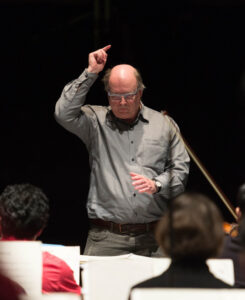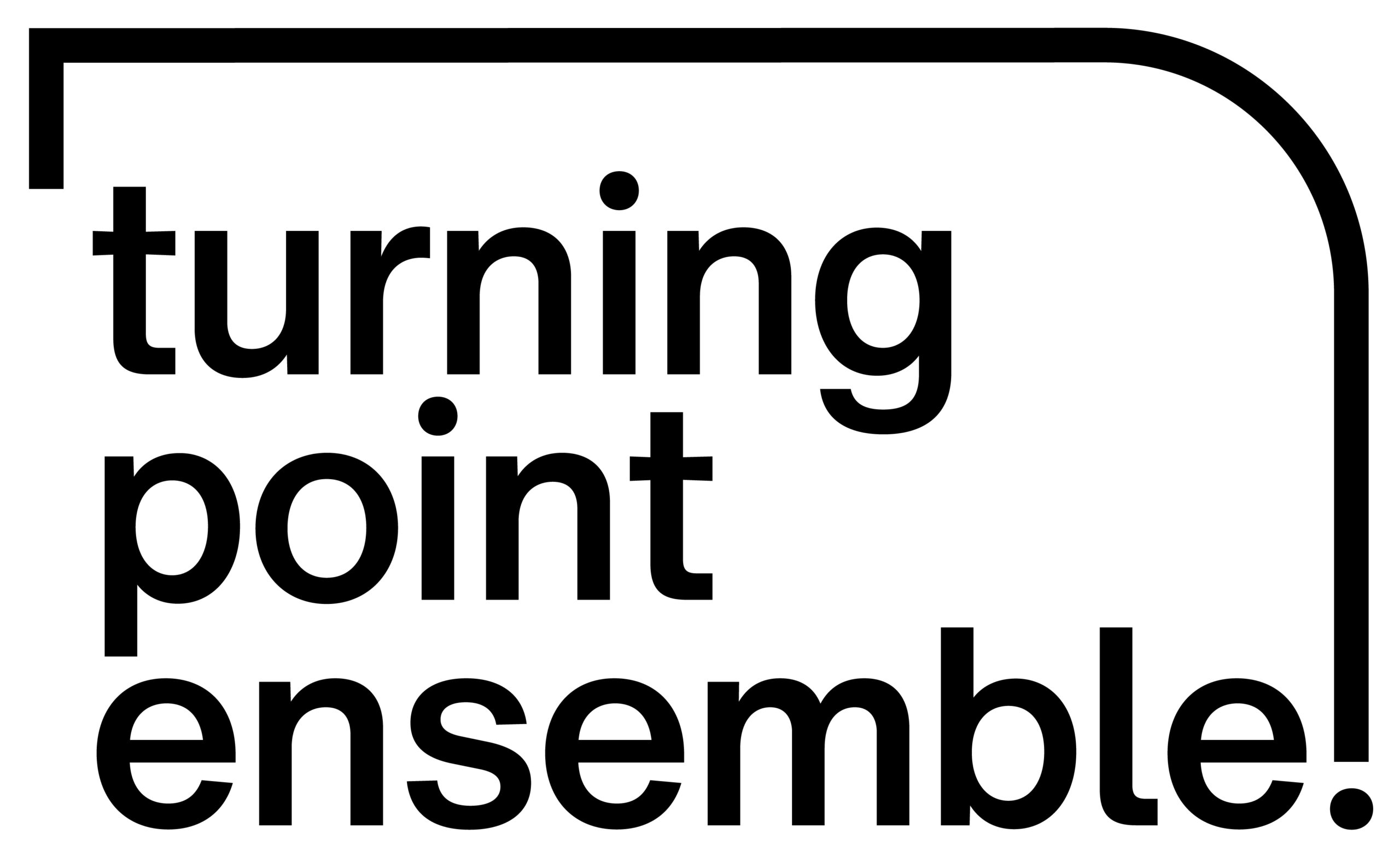 Read the below Q&A with Owen Underhill learn more about how Turning Point Ensemble’s European Tour came to be, our collaboration with Cantus Ensemble of Croatia and our upcoming concert in Zagreb on May 15 at the Lisinski Concert Hall.
Read the below Q&A with Owen Underhill learn more about how Turning Point Ensemble’s European Tour came to be, our collaboration with Cantus Ensemble of Croatia and our upcoming concert in Zagreb on May 15 at the Lisinski Concert Hall.
Turning Point Ensemble was founded in the early 2000s. Can you recall the beginnings, motives, reasons, and needs for establishing the ensemble?
Turning Point Ensemble was formed by its musician members in 2002, just over 20 years ago. The goal was to create a large chamber group in-between orchestra and small chamber that would play masterworks of the early 20th century through to new music, thus giving the opportunity for the founding musicians to play repertoire that they always wished to play, but is not part of their regular music-making with other ensembles. We have striven to create connections between music of earlier periods and the present day in our concerts and productions. Our first work on our first concert was Anton Webern’s extraordinary arrangement of the Bach Ricercar in 6 parts from The Musical Offering.
The collaboration between Cantus and Turning Point Ensemble has been ongoing for several years now. How did it start?
There were several connections and contacts between Zagreb and Vancouver that facilitated the beginning of our collaboration. This included the past connection between our Board President Dubravko Pajalic and Berislav Šipuš dating back to Dubravko’s years in his home town Zagreb, and the performance of Turning Point Ensemble in the 2017 World New Music Days Festival in Vancouver where we performed a work of Croatian composer Sanda Majureč. We met during that festival, and from there we began discussions about a long-term relationship which led to a guest conductor performance of myself in Zagreb with Cantus Ensemble in September 2019, a guest conductor performance of Berislav Šipuš in Vancouver with Turning Point Ensemble in April 2022, the present Turning Point Ensemble concert in Zagreb, and the upcoming performance of Cantus Ensemble in Vancouver in the fall of 2024.
What did the first encounter between the ensembles look like? Are there a lot of similarities between the two groups?
The concert in September 2019 was a fantastic experience. In addition to my role as guest conductor of the concert, our former Turning Point Ensemble cellist, Ariel Barnes, came from Germany to perform as soloist in my Cello Concerto. Other composers represented from the West Coast of Canada were Dorothy Chang, John Oliver, and Edward Top. I think this first concert gave an opportunity for the Croatian audience to hear an ambitious and lively concert of Canadian music firsthand, as well as for the musicians of the Cantus Ensemble to establish a connection directly with musicians, and composers from Vancouver connected with Turning Point Ensemble. From this experience, it was clear to me that both Cantus and Turning Point Ensemble are well-matched ensembles that play critical roles in building a distinctive culture in their respective cities and also through international connections.
Your collaboration is about more than just exchanging ensembles and guest performances, it’s also about the synergy that results from creating music with another ensemble. What experiences are created this way?
I think these detailed and meaningful collaborations create connections that are very profound. Playing each others music is personal; it gets beneath the superficiality of normal touring or concertizing. It gets at the meaning of the making of art in our respective countries and how the music resonates above and beyond the local experience. It also reveals the character of the music and cultural aesthetics present in our respective homes to not only the musicians involved, but to a wider audience in both countries. We have tried to build on this through follow-up stages in our collaboration including commissions of emerging composers that we are performing in our touring concerts.
Can you comment on the Croatian music you have come into contact with during this collaboration? Which composers and works have left an impression?
That is a very interesting question that I have been thinking about. I have found that there are some cultural similarities that are surprising and interesting. Although music composed in Croatia and Canada is very diverse, I do think that one senses in that music some distinct characteristics and cultural attributes. One is that contemporary music cultures in both Croatia and Canada are I think vibrant and healthy, and in my opinion, not as widely known as they deserve to be internationally due to the relatively smaller populations of both countries.
The concert of Croatian music that Maestro Šipuš conducted with Turning Point Ensemble was firstly a magnificent program, and secondly, it traced musical developments and relationships between the music of Stankho Horvat, Srdan Dedič, Marko Ruždak, Krešimir Seletkovič, and Berislav Šipuš. I have heard in this concert and in other Croatian music I have come to know that there is an originality, a combination of playfulness and experimentation, a lively and complex relationship with folk musics and language, and an unpretentious and powerful expression. I am not surprised that this concert in Vancouver was so well received.
During its European tour, TPE will be premiering a new piece by Helena Skljarov, an up and coming Croatian composer. Can you tell us more about this piece?
We are delighted to present the premiere of Helena Skljarov’s The Red-Haired Man. From the beginning, the work is full of surprises, with a bold theatricality, a fascinating combination of sounds that transcends instrumental sound with the use of vocal sounds, and also the unworldly presence of poetry, specifically the poem Red-Haired Man from the Russian poet Daniil Kharms. Audiences in Zagreb will not want to miss this piece!
What are the trends, composers’ interests, directions, etc., in the contemporary classical music scene in Canada?
Canada is a large country with different ecologies of music practice from the west coast to the major urban centers of Toronto and Montreal. I believe our concert will give an interesting representation including Canada’s arguably most internationally influential composer, writer and educator Murray Schafer; a premiere of a new work by Canadian composer Michael Pepa who has worked off and on in Croatia for several decades; one of Canada’s most prominent mid-generation composers Ana Sokolovič (originally from Belgrade and a Montreal resident for the last three decades); and also works from myself and my Vancouver colleague Rita Ueda. Turning Point Ensemble will be joined on the program by soprano Robyn Driedger Klassen and the extraordinary viola soloist Rivka Golani. I believe this program will show the inventive spirit and richness present in Canadian music. All the composers presented have had ongoing relationships with Turning Point Ensemble.
After many years of collaboration, has the Croatian-Canadian collaboration closed, or are there any further plans?
The cycle has not yet closed because we are building now for the visit of Cantus Ensemble to our Turning Point Ensemble series in the fall of 2024. There is much planning already underway by Maestro Šipuš for this concert which will also include a new commission written for Cantus Ensemble by the young Vancouver composer Ramsey Sadaka.
Finally, we would remiss not to take the opportunity to ask you about your other current projects and plans. Please tell us what you are working on at the moment.
I am working on a few larger projects – one is a second album of my music for string quartet with the Bozzini Quartet from Montreal, another is a larger song cycle called Bee Studies with poet Renée Sarojini Saklikar, of which I will present three songs in the upcoming concert; and a third is a series of unaccompanied choral pieces, the Gaudi Madrigals based on pronouncements of the Catalan architect Antonio Gaudi.
